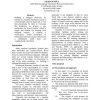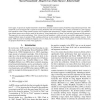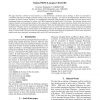14 search results - page 1 / 3 » Lexical Transfer Using a Vector-Space Model |
ACL
2000
15 years 3 months ago
2000
Building a bilingual dictionary for transfer in a machine translation system is conventionally done by hand and is very time-consuming. In order to overcome this bottleneck, we pr...
114
click to vote
NAACL
2010
14 years 12 months ago
2010
Current vector-space models of lexical semantics create a single "prototype" vector to represent the meaning of a word. However, due to lexical ambiguity, encoding word ...
LREC
2008
15 years 3 months ago
2008
In this paper, we present an original framework to model frame semantic resources (namely, FrameNet) using minimal supervision. This framework can be leveraged both to expand an e...
148
click to vote
LREC
2008
2008
Building a Bilingual Representation of the Roget Thesaurus for French to English Machine Translation
15 years 3 months ago
This paper describes a solution to lexical transfer as a trade-off between a dictionary and an ontology. It shows its association to a translation tool based on morpho-syntactical...
115
Voted
ENTCS
2011
14 years 9 months ago
2011
We use Bell states to provide compositional distributed meaning for negative sentences of English. The lexical meaning of each word of the sentence is a context vector obtained wi...



